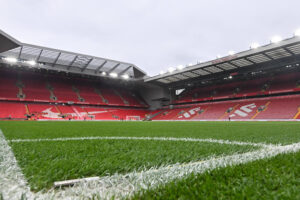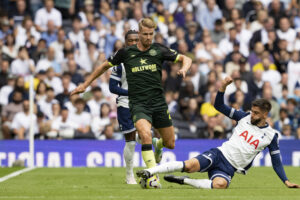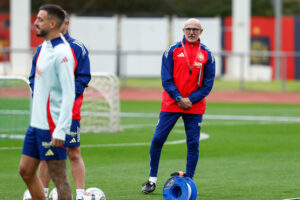Famous Five: after Troy Deeney publicly accused Arsenal of lacking “cojones”, here are five other legendary footballing insults or putdowns.
The best insults stick, and they stick because they are accurate. They identify some flaw or weakness and then give a name to it. Thus it was that Watford striker Troy Deeney hit such a nerve last weekend, when he used a post-match interview after Watford’s 2-1 defeat of Arsenal to publicly accuse the Gunners players of lacking “cojones” or “nuts”.
Here are five more famous footballing insults, when the use of a particular word to describe an opponent has become a brutal tag to label them with, and in some cases a tag that they could never shake off.
“Babies”—Patrice Evra on Arsenal, 2009
Of course, Deeney is not the first opponent to publicly question the attitude and commitment of an Arsenal side. Nearly a decade ago, Manchester United’s Patrice Evra celebrated a comfortable semi-final win in the Champions League by claiming that the contest had been “11 men against 11 babies”.
The use of the word “babies” was so controversial that Arsenal’s centre-half, Mikael Silvestre, who had played alongside the Frenchman for United before joining the Gunners, accused him of a lack of respect for his fellow professionals. Needless to say, Evra never apologised or retracted the claim.
“Voyeur”—José Mourinho on Arsène Wenger, 2005
It is not only Wenger’s players who have been trashed and trash-talked about in recent years. The Arsenal manager himself has come in for increasing amounts of criticism, inside and outside of the club. The most memorable charge made against the Frenchman during his long Arsenal tenure was not that he was incompetent but, worse, that he was “a voyeur”.
It was José Mourinho who made that claim, near the start of his second season at Chelsea. He did so in response to what he regarded as Wenger’s unhealthy obsession with the club that had used Roman Abramovich’s petro-roubles to replace Arsenal at the top of the English game.
Of course, once you hurl mud around there is a danger that some of it will stick to you, and that was the case for Mourinho recently. Antonio Conte, his replacement as Chelsea manager, responded to Mourinho’s allegation that other Premier League managers “cried and cried” about the injuries they suffered whereas he simply got on with the job. When the matter was raised with the Italian, he responded furiously, in effect suggesting Mourinho himself was the “voyeur” in question.
“Enemy of Football”—Volker Roth on José Mourinho
Mourinho has been the subject of several stinging verbal attacks himself. Of all the allegations against him, the worst by far was that he was an “enemy of football” – that is, an opponent to or, even a parasite upon, the game that gives him such a wonderful living.
That charge was made against Mourinho in 2005 by Volker Roth, who at the time was the chairman of UEFA’s Referees’ Committee. Roth was reacting to the retirement of a top referee, Anders Frisk, which apparently followed Mourinho’s accusation that Frisk had talked privately at half-time to Barcelona’s then manager, Frank Rijkaard, during a Champions League game with Chelsea. In effect, Mourinho was accusing Frisk of colluding with the Dutchman against his side.
So Roth said, “It’s the coaches who whip up the masses and actually make them threaten people with death. We can’t accept that one of our best referees has been forced to quit because of this. People like Mourinho are the enemy of football.”
As with all these memorable putdowns, the phrase “enemy of football” has stuck to Mourinho precisely because so many people feel that it is entirely accurate, and not because he had at least attempted to put pressure on a referee. Clearly, it is a soft spot for the Portuguese, who may never earn the adoration of neutrals that other managers (even his arch rival, Wenger) have earned, because none of his teams have ever gone for the kind of all-out attack on the field that he has made his own trademark in interviews and press conferences.
“A Clown”—Brian Clough on Jan Tomaszewski, 1973
Brian Clough is the greatest wit that football has ever known, with endless lines of his entering the footballing lexicon. Despite this, he never really opted to belittle opponents. In fact, the one time that Clough resorted to this tactic, it backfired against him, and the whole of English football, spectacularly.
The time and place was October 1973 at Wembley, when Clough was one of the guests on the ITV panel previewing England’s crucial World Cup qualifying match against Poland. Having already lost to Poland away, England had to beat them to qualify for the following year’s tournament in West Germany. Before the match had even started, however, Clough said of the Polish goalkeeper, Jan Tomaszewski, that he was “a circus clown in gloves”. The original, typically memorable phrase from the manager was largely forgotten, but the simple epithet of “clown” stuck like glue.
The irony, of course, was that although much of Tomaszewski’s performance that night was unusual to say the least (at one point, he used his knees to save an England shot), it was ultimately effective. Instead, it was the England goalkeeper, a young Peter Shilton, who made the mistake that allowed Poland to qualify at England’s expense, when he let Jan Domarski’s shot squirm under him and end up in the England net. England recovered to force a draw, but it was not enough. As for Poland, they not only reached the 1974 World Cup but ended up finishing third, thus ensuring that Clough’s “clown” had the last laugh.
Len Shackleton on the Average Director’s Knowledge of Football
Unlike Jan Tomaszewski, Len Shackleton was not a “clown” but, famously, “the Clown Prince of Soccer”, which was the title of his 1956 autobiography. In that book, he memorably summed up the “The Average Director’s Knowledge of Football” by including a completely blank page. Unlike the other insults on this list, it was a written insult rather than a verbal one, but it was all the better for it, because written insults last longer.
Shackleton’s jibe against board directors was heart-felt, because it came at a time when even the finest English footballers were little more than paid slaves for their paymasters, the chairman and board of directors who ran every English club. Like most players of his era, he begrudged the control that non-footballers like club directors exercised over their playing staff. He took out a lot of that anger on the pitch, but his reputation for joking around and creating controversy was such that he only won five international caps, even though his talent merited many more.
Of course, Shackleton had the last word in his autobiography, which remains one of the greatest footballing autobiographies. Fittingly, he became a football writer after he retired from playing in 1957, but nothing he ever wrote had half the impact of what he didn’t write about football’s rulers and administrators.
Main Photo
Embed from Getty Images






